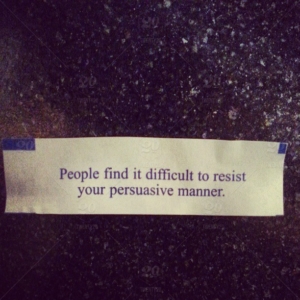4 Little Ways to Persuade Like a Pro
Just think. Wouldn’t it be wonderful if you could always manage to persuade someone to go for your product, nail that oh-so-important interview for that dream job or simply get someone to say “yes” to listen to what you have to say. It would indeed!
Imagine you had a magical vocabulary box overflowing with all the right words and phrases ready to pluck out and use just at the right time – to persuade and influence.
The words we use in the workplace ultimately, often lead to success or failure from launching a product, building team rapport, or trying to fix a relationship – knowing the right words spoken at the right time is a powerful skill to have.
Table of Contents
“Words are, of course, the most powerful drug used by mankind.”―Rudyard Kipling
 My day-to-day work is all about words. I need to think hard about which words to put down on paper (like I am right now) and which to say during a presentation or skills workshop. Equally, I think carefully about the words I advise others to use when they present in public – so words have become an essential part of what I do. I’m fascinated about the art of persuasion and how just a few words can make all the difference.
My day-to-day work is all about words. I need to think hard about which words to put down on paper (like I am right now) and which to say during a presentation or skills workshop. Equally, I think carefully about the words I advise others to use when they present in public – so words have become an essential part of what I do. I’m fascinated about the art of persuasion and how just a few words can make all the difference.
The most persuasive words
If I were to ask you what are the most persuasive words you can think of, what would come to mind? Interestingly the most persuasive words are often very short and snappy – words which often appear in most forms of advertising and marketing. Were any of these on your list?
Affordable
Best
Convenient
Discover
Easy
Enjoy
Fast
Free
Guarantee
More
New
Power
Reduce
Results
Safe
Save
Time
You’ll often see a combination of these words thrown together to create power phrases, portraying value and helping the customer to positively visualize the product or service. How do these sound? “It’s an easy and fast service to use and you can enjoy the benefits at home or on the go!”. “You’ll discover the results you need, while reducing costs and above all, generate more money”.
It’s all about You
Those two little words ‘you’ and ‘your’ are actually ranked somewhere at the top of the list of the most persuasive words. They refer directly to the listener and tap in to what he’s ultimately thinking; “What’s in it for me?” Try switching to the perspective of your listener rather than always yours. This will start to grab your listener’s attention and include them more in the conversation.
Share opinions reluctantly
In a conversation where you’ve got two sets of opinions, trying to sway over someone to see your point of view can be tricky. Try this. Say you used to have the other opinion but switched over in light of a change or some overwhelming evidence. Use a phrase such as “Yes, I used to think the same. But here’s what changed my mind.” By taking this strategic approach, you’ll sound impartial and even-minded. An approach known as “reluctant conclusion”
It’s all in a name
 Something I’ve often noticed during UK election debates and Q&A sessions with the public is the way certain politicians answer by using the name of the person who’s just asked a question. It’s a technique they do well. It’s a technique that works. The most important word in any language that always sounds so sweet is actually your own name. When someone mentions your name, you sit up and tend to listen with more intent. Equally, our impression of the speaker steps up a notch as we feel this person listens well and pays attention. Try it. The next time you meet someone new – at a meeting or seminar, try to clearly remember that person’s name and mention it somewhere during the conversation. See what happens.
Something I’ve often noticed during UK election debates and Q&A sessions with the public is the way certain politicians answer by using the name of the person who’s just asked a question. It’s a technique they do well. It’s a technique that works. The most important word in any language that always sounds so sweet is actually your own name. When someone mentions your name, you sit up and tend to listen with more intent. Equally, our impression of the speaker steps up a notch as we feel this person listens well and pays attention. Try it. The next time you meet someone new – at a meeting or seminar, try to clearly remember that person’s name and mention it somewhere during the conversation. See what happens.
Switch to the future tense
Here’s a handy essential tool of argument that works-a-treat! The next time you find yourself in a situation where you’ve been accused of something (in the past tense) or insulted (in the present tense), do one thing – switch tenses. Think how to correct the situation or improve the relationship by using words in a future tense. Believe it or not, the most productive arguments include the future tense, the language of choices and decisions. It starts to take the anger out of confrontations. This is a persuasion technique Aristotle coined as “deliberative argument.” Try it. You’d be surprised.
So, it’s now over to you.
If you’ve got some tips of your own or found this post helpful – please spread the word and leave a message!
About the author: Peter Hopwood

Peter Hopwood is a copywriter, workplace communications trainer and founder of Libris communications based in Eastern Europe. He focuses on helping professionals to make a stronger impact with their personal communication via customer service training, copywriting, public speaking and presentation skills.




Peter – Thank you for this post. However, I disagree about the use of future tense. Without a time element, the future tense is an empty promise. It never happens. Just like the sign at the restaurant that says, “Free Crab Tomorrow,” of the sign at the local bar that says, “Free Beer Tomorrow” – One comes back the next day – but the sign never changes, so the free crab or beer is never served.
It is something similar to the phrase some kids use these days: “My bad.” This is a fake and insincere phrase to replace “I’m sorry.”
Take a look at my post about present tense for my views on this: https://www.linkedin.com/pulse/what-tense-you-wayne-yoshida?trk=mp-reader-card
Thanks again – and keep posting, Copywriter Collective is great!
Wayne Yoshida
Technical Writer